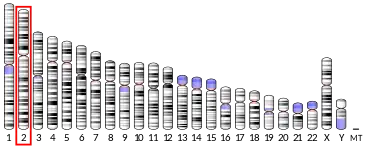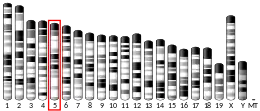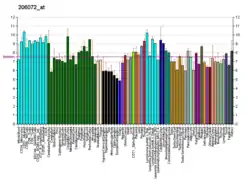MPV17
Protein MPV17 is a protein that in humans is encoded by the MPV17 gene.[5][6][7] It is a mitochondrial inner membrane protein, which has a so far largely unknown role in mtDNA maintenance. Protein MPV17 is expressed in human pancreas, kidney, muscle, liver, lung, placenta, brain and heart.[8] Human MPV17 is the orthologue of the mouse kidney disease gene, Mpv17. Loss of function has been shown to cause hepatocerebral mtDNA depletion syndromes (MDS) with oxidative phosphorylation failure and mtDNA depletion both in affected individuals and in Mpv17−/− mice.[6][9]
Function
This protein was first thought to be a peroxisomal protein, but in 2006, Spinazzola demonstrated that it is a mitochondrial inner membrane protein that is implicated in the formation of reactive oxygen species (ROS).
Restoration of Mpv17 expression in a Mpv17-/- mice restore mtDNA copy number, suggesting MPV17 is involved in mtDNA copy number, and in mtDNA maintenance.[10]
MPV17 seems to be also involved in apoptosis in podocytes, and involved in ROS.[11]
Structure
Gene
The human MPV17 gene is located on chromosome 2 at p21-23, comprising eight exons encoding 176 amino acids.[7]
Protein
MPV17 belongs to a family of integral membrane proteins consisting of four members (PXMP2, MPV17, MP-L, and FKSG24 (MPV17L2)) in mammals and two members (Sym1 and Yor292) in yeast. The amino acid sequence of MPV17 (176 amino acids) contains four cysteine residues and three putative phosphorylation sites implies that this protein may act as a redox- and ATP-sensitive channel.[12]
Clinical significance
Mutations in this gene have been associated with the hepatocerebral form of mitochondrial DNA depletion syndrome (MDS), a mutation in this protein leads to an mtDNA (mitochondrial DNA) copy number decrease.[7] By 2013, MDS caused by MPV17 mutations had been reported in 32 patients with the clinical manifestations including early progressive liver failure, neurological abnormalities, hypoglycaemia and raised blood lactate.[8] In addition, MPV17 mutations have also been associated with autosomal recessive adult-onset neuropathy and leukoencephalopathy with multiple mtDNA deletions in skeletal muscle.[13] Thus, MPV17 mutations can lead to recessive MDS or recessive multiple mtDNA deletion disorders.
Interactions
MPV17 has been shown to interact with Prkdc protein during Adriamycin-induced nephropathy in mice.[14]
References
- GRCh38: Ensembl release 89: ENSG00000115204 - Ensembl, May 2017
- GRCm38: Ensembl release 89: ENSMUSG00000107283 - Ensembl, May 2017
- "Human PubMed Reference:". National Center for Biotechnology Information, U.S. National Library of Medicine.
- "Mouse PubMed Reference:". National Center for Biotechnology Information, U.S. National Library of Medicine.
- Karasawa M, Zwacka RM, Reuter A, Fink T, Hsieh CL, Lichter P, Francke U, Weiher H (Nov 1993). "The human homolog of the glomerulosclerosis gene Mpv17: structure and genomic organization". Human Molecular Genetics. 2 (11): 1829–34. doi:10.1093/hmg/2.11.1829. PMID 8281143.
- Spinazzola A, Viscomi C, Fernandez-Vizarra E, Carrara F, D'Adamo P, Calvo S, Marsano RM, Donnini C, Weiher H, Strisciuglio P, Parini R, Sarzi E, Chan A, DiMauro S, Rötig A, Gasparini P, Ferrero I, Mootha VK, Tiranti V, Zeviani M (May 2006). "MPV17 encodes an inner mitochondrial membrane protein and is mutated in infantile hepatic mitochondrial DNA depletion". Nature Genetics. 38 (5): 570–5. doi:10.1038/ng1765. PMID 16582910. S2CID 17999433.
- "Entrez Gene: MPV17 MpV17 mitochondrial inner membrane protein".
- Uusimaa J, Evans J, Smith C, Butterworth A, Craig K, Ashley N, Liao C, Carver J, Diot A, Macleod L, Hargreaves I, Al-Hussaini A, Faqeih E, Asery A, Al Balwi M, Eyaid W, Al-Sunaid A, Kelly D, van Mourik I, Ball S, Jarvis J, Mulay A, Hadzic N, Samyn M, Baker A, Rahman S, Stewart H, Morris AA, Seller A, Fratter C, Taylor RW, Poulton J (Feb 2014). "Clinical, biochemical, cellular and molecular characterization of mitochondrial DNA depletion syndrome due to novel mutations in the MPV17 gene". European Journal of Human Genetics. 22 (2): 184–91. doi:10.1038/ejhg.2013.112. PMC 3895632. PMID 23714749.
- Viscomi C, Spinazzola A, Maggioni M, Fernandez-Vizarra E, Massa V, Pagano C, Vettor R, Mora M, Zeviani M (Jan 2009). "Early-onset liver mtDNA depletion and late-onset proteinuric nephropathy in Mpv17 knockout mice". Human Molecular Genetics. 18 (1): 12–26. doi:10.1093/hmg/ddn309. PMC 2644642. PMID 18818194.
- Bottani E, Giordano C, Civiletto G, Di Meo I, Auricchio A, Ciusani E, Marchet S, Lamperti C, d'Amati G, Viscomi C, Zeviani M (Jan 2014). "AAV-mediated liver-specific MPV17 expression restores mtDNA levels and prevents diet-induced liver failure". Molecular Therapy. 22 (1): 10–7. doi:10.1038/mt.2013.230. PMC 3880585. PMID 24247928.
- Casalena G, Krick S, Daehn I, Yu L, Ju W, Shi S, Tsai SY, D'Agati V, Lindenmeyer M, Cohen CD, Schlondorff D, Bottinger EP (Jun 2014). "Mpv17 in mitochondria protects podocytes against mitochondrial dysfunction and apoptosis in vivo and in vitro". American Journal of Physiology. Renal Physiology. 306 (11): F1372-80. doi:10.1152/ajprenal.00608.2013. PMC 4042102. PMID 24598802.
- Antonenkov VD, Isomursu A, Mennerich D, Vapola MH, Weiher H, Kietzmann T, Hiltunen JK (May 2015). "The Human Mitochondrial DNA Depletion Syndrome Gene MPV17 Encodes a Non-selective Channel That Modulates Membrane Potential". The Journal of Biological Chemistry. 290 (22): 13840–61. doi:10.1074/jbc.M114.608083. PMC 4447960. PMID 25861990.
- Blakely EL, Butterworth A, Hadden RD, Bodi I, He L, McFarland R, Taylor RW (Jul 2012). "MPV17 mutation causes neuropathy and leukoencephalopathy with multiple mtDNA deletions in muscle". Neuromuscular Disorders. 22 (7): 587–91. doi:10.1016/j.nmd.2012.03.006. PMC 3387382. PMID 22508010.
- Papeta N, Zheng Z, Schon EA, Brosel S, Altintas MM, Nasr SH, Reiser J, D'Agati VD, Gharavi AG (Nov 2010). "Prkdc participates in mitochondrial genome maintenance and prevents Adriamycin-induced nephropathy in mice". The Journal of Clinical Investigation. 120 (11): 4055–64. doi:10.1172/JCI43721. PMC 2964992. PMID 20978358.
Further reading
- Schenkel J, Zwacka RM, Rutenberg C, Reuter A, Waldherr R, Weiher H (Jul 1995). "Functional rescue of the glomerulosclerosis phenotype in Mpv17 mice by transgenesis with the human Mpv17 homologue" (PDF). Kidney International. 48 (1): 80–4. doi:10.1038/ki.1995.270. PMID 7564095.
- Weiher H (1993). "Glomerular sclerosis in transgenic mice: the Mpv-17 gene and its human homologue". Advances in Nephrology from the Necker Hospital. 22: 37–42. PMID 8427063.
- Iida R, Yasuda T, Tsubota E, Takatsuka H, Masuyama M, Matsuki T, Kishi K (Feb 2003). "M-LP, Mpv17-like protein, has a peroxisomal membrane targeting signal comprising a transmembrane domain and a positively charged loop and up-regulates expression of the manganese superoxide dismutase gene". The Journal of Biological Chemistry. 278 (8): 6301–6. doi:10.1074/jbc.M210886200. PMID 12471025.
- Calvo S, Jain M, Xie X, Sheth SA, Chang B, Goldberger OA, Spinazzola A, Zeviani M, Carr SA, Mootha VK (May 2006). "Systematic identification of human mitochondrial disease genes through integrative genomics". Nature Genetics. 38 (5): 576–82. doi:10.1038/ng1776. PMID 16582907. S2CID 11573946.
- Iida R, Yasuda T, Tsubota E, Takatsuka H, Matsuki T, Kishi K (Jun 2006). "Human Mpv17-like protein is localized in peroxisomes and regulates expression of antioxidant enzymes". Biochemical and Biophysical Research Communications. 344 (3): 948–54. doi:10.1016/j.bbrc.2006.04.008. PMID 16631601.
- Karadimas CL, Vu TH, Holve SA, Chronopoulou P, Quinzii C, Johnsen SD, Kurth J, Eggers E, Palenzuela L, Tanji K, Bonilla E, De Vivo DC, DiMauro S, Hirano M (Sep 2006). "Navajo neurohepatopathy is caused by a mutation in the MPV17 gene". American Journal of Human Genetics. 79 (3): 544–8. doi:10.1086/506913. PMC 1559552. PMID 16909392.
- Wong LJ, Brunetti-Pierri N, Zhang Q, Yazigi N, Bove KE, Dahms BB, Puchowicz MA, Gonzalez-Gomez I, Schmitt ES, Truong CK, Hoppel CL, Chou PC, Wang J, Baldwin EE, Adams D, Leslie N, Boles RG, Kerr DS, Craigen WJ (Oct 2007). "Mutations in the MPV17 gene are responsible for rapidly progressive liver failure in infancy". Hepatology. 46 (4): 1218–27. doi:10.1002/hep.21799. hdl:2027.42/142478. PMID 17694548. S2CID 6198280.




